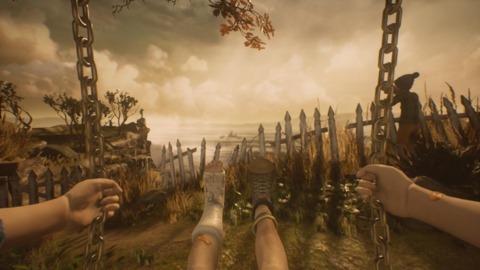A Tale of Two Walking Simulators
By JJWeatherman 5 Comments
I think it’s fair to say that Gone Home was a bit of a revelation for me. Just in terms of game design, it’s perhaps mostly responsible for a clear pivoting point in my taste in games. Similar to the way Rock Band introduced me to a new genre in rhythm gaming and started a years-long obsession, I feel like my interest in games these days seems the strongest when I’m experiencing a concise and very deliberate story. I think the fascination stems from the same place that my appreciation of short stories stems from. To me, there’s nothing more impressive than a creation in which every piece feels meaningful and deliberately placed. This is why Gone Home resonated so much with me, and why I now seek out similar experiences as this genre’s popularity continues to grow.
Recently I’ve played a couple of games--practically back to back--that show the same kind of passion and focused story telling that I’ve come to love. It’s a good time to be a fan of walking simulators! And just to be clear, I don’t use the term “walking simulator” derogatorily. I used to really dislike the term, and honestly I still kind of do, but I also find it to be funny. I figure I’ll just embrace it.

A couple of weeks back I finally played a game I’d heard much praise for, but hadn’t seen much of personally. That game was What Remains of Edith Finch. Things start off pretty simply, with the protagonist, Edith, walking through a wooded area on her way to her childhood house, which is apparently on Orcas Island in Washington state. Hmm, returning to an empty home located in the Pacific Northwest? This seems immediately too familiar. Things get interesting very quickly though as you uncover more about Edith’s family history and learn that the entire family has an eerie tendency to, in one way or another, die young. In a series of vignettes that comprise the meat of the game, you learn a bit about each of the family members, and how they ended up passing away. The game’s premise is perhaps inherently a bit disturbing, though the way these vignettes play out is extremely creative in most cases, and they subvert any expectations one might have going into a game like this. It was all just done so well, and it was definitely one of the best surprises I’ve experienced from a game in quite a while. By the end I’d become so engrossed in the stories of the members of this family that I actually got pretty emotional as the final pieces of the story played out, and Edith’s motivations for visiting the house to begin with became clear. I was able to have this experience that felt so enormous and meaningful within the time span of two or three hours, and therein lies the beauty. It’s a pretty closely guided experience, sure, but everything existed for a reason, and every moment meant something. It just makes for such a beautiful experience.

The other game I played, this even more recently, is Tacoma. Tacoma is of course Fullbright’s follow up to Gone Home, and that alone carries a lot of expectation. Thankfully I feel like Steve Gaynor and the team were able to create something worthy of the lofty expectations. Tacoma takes place on the “lunar transfer station Tacoma,” a place that’s perhaps not the desired final destination of someone going into space, but rather a stepping stone to something greater, perhaps. The station is run by a corporation called Venturis, and none of the staff on Tacoma seem very thrilled with their employer. In fact, it’s actually pretty humorous and maybe a tad depressing when you realize that in this amazing future where space travel is possible, people are still going to hate their jobs. Everything can be so amazing, and still no one is happy. Almost as if it were the best of times, and simultaneously the worst of times... Anyway. You just know it’s true, though. Everything about Tacoma’s story seems incredibly, disturbingly plausible. The writing and voice acting play a huge part in that. Every side bit of story and information is worth seeking out, and adds to the impact of the story by creating believable emotional links between characters. And seeking out those bits of story is especially easy and rewarding due to the primary innovation Fullbright has introduced to the genre, which is a mechanic that allows you to scrub through story scenes as if they were videos. Different interactions and bits of story play out simultaneously in different parts of the station, and the only way to absorb it all is to continuously rewind in very freeform nature and follow each character’s movements in whichever order you see fit. This really makes it feel like you’re a fly on the wall experiencing all of the key moments of a space station in crisis.
I really enjoyed Tacoma. I do think it being set in space takes away that grounded feel of something like Gone Home or Edith Finch, which is an aspect I tend to prefer. That said, space is at least different and interesting, so I can appreciate that. The game also just left me wanting a little more. When the credits hit I still had questions about characters, organizations, and some other aspects of the universe they’ve built. I honestly find a little ambiguity to be fun, though. Necessary, even, in any great story. Anyway, I’ll likely play through it again and see if I can pick up on any bits of information I may have missed the first time through.
Thanks for taking the time to absorb my semi-coherent thoughts. I’d love to hear what others think of Tacoma considering its relation to such a popular game in Gone Home, and after the years of build up to it. Surprisingly, there hasn’t been much discussion of it here on the forums so far!
